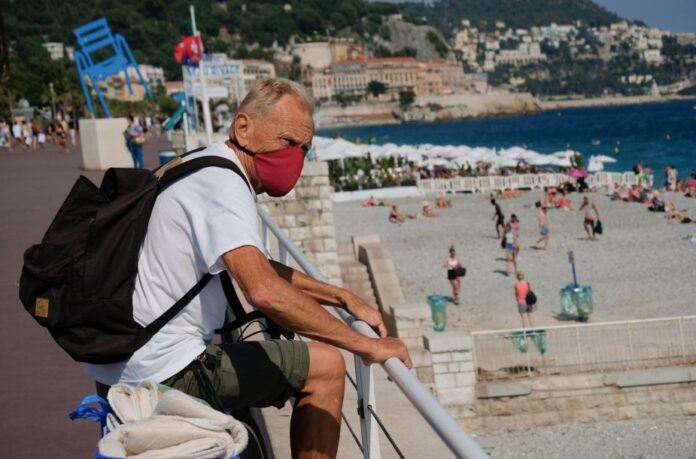
New Labour Party Candidate
On July 31, BNS announced that the Lithuanian Labour Party has named former agriculture minister Vigilijus Jukna as their lead candidate for the parliamentary election on October 11. He will replace European Parliament member Viktor Uspaskich, the party’s chairman. “I see myself in the executive branch, so I’m the party’s candidate for prime minister”, Uspaskich told reporters on July 30 after the party’s council announced the line-up of candidates. MP Valentinas Bukauskas is number two on the list, followed by businessman and former MEP Antanas Guoga, MP Mindaugas Puidokas, and Vilnius city councilor Ieva Kačinskaitė-Urbonienė. The latest Vilmorus opinion poll published by the daily Lietuvos Rytas on July 25 found that 6.2% of respondents would vote for the Labour Party, up from 4.6%.
Arrivals from France must Isolate
People arriving in Lithuania from France will have to self-isolate for two weeks as of August 3, said Lithuania’s top epidemiologist Loreta Ašoklienė. A total of 12 countries will be on Lithuania’s “blacklist” as of that date. Only Lithuanians will be able to come from ten of those countries.
Regular flights from Lithuania to France are not carried out by airBaltic, Wizz Air and Ryanair, according to Lithuania’s airport operator, Lietuvos Oro Uostai (Lithuanian Airport Authority). AirBaltic flights to Paris and back take place on Tuesdays, Thursdays and Saturdays. Wizz Air fliesto Nice on Wednesdays and Sundays, and Ryanair’s flights to Paris take place on Tuesdays and Sundays, according to information on their official websites.
Foreigners will not be allowed to come from Spain, Sweden, Belgium, Portugal, Romania, the Czech Republic, Bulgaria, Luxembourg, Croatia and Malta. The decision on the latter might change as the impact on sick rescued migrants on the country’s rates is being analyzed, Ašoklienė said.
Countries are put on Lithuania’s “blacklist” if they record 16 coronavirus cases per 100,000 of population over the past two weeks. The rate now stands at 15.7 cases per 100,000 in Poland, therefore, this country is likely to be put on the list in a week. Morbidity rates in Latvia and Estonia are similar and stand at 2.6 cases per population of 100,000. The rate currently stands at 5.7 cases per 100,000 in Lithuania.
Economy Bearing Up Well
On July 30 the Finance Ministry issued a report showing that Lithuania’s economy has withstood COVID-19 challenges surprisingly well. Economic activity has shown an upward trend since May, with recovery of losses incurred during April. The last half of the year may be viewed with cautious optimism, say economists, with recovery in consumer spending, positive manufacturing trends, increase in employment offers as well as more hopeful commercial and consumer prognoses for the future. It is too early to tell whether these positive half-year results will actually become a solid trend for the last six months of the year. A recent increase in COVID-19 cases may put a lid back on non-essential consumer spending, and uncertainty regarding the future may delay investment again.
According to the Statistics Department, Lithuania’s GNP compared to the second quarter of 2019 slipped by 3.7% and only 0.6% over the first half-year.
Retail statistics for household goods have gone back to pre-COVID-19 levels.
Annual inflation in June was still low at 0.9%, although excluding energy products it was at 3%. Food and service prices have gone up, with food and non-alcoholic beverage rising by 3.1%. Manufacturing production rose by 6.3%. Over the past four weeks employment opportunities have increased by 32.4% over the previous 4-week period, and the Employment Bureau shows 19,000 available jobs.
Labour Code Changes
Beginning in August, various changes in labour laws are taking effect. Working conditions for those with health issues will be more accommodating, allowing working from home and higher compensation for illness. Employment conditions for Lithuanians on projects with foreign workers will be improved. Lengthy vacancies due to delays in job competitions will be resolved by means of contract deadlines.
Discrimination on the basis of a health coondition will not be legal, in line with other established criteria such as gender, race, nationality, language, origin, social status, age, sexual orientation, disability, ethnicity, membership in a political party or associastion, religion, faith, beliefs or views.
Longer periods of working from home will now be granted to pregnant or nursing mothers, parents of children up to 3 years old, single parents of children up to 14 years of age, or disabled children up to 18 years of age. Severance pay will be increased for employees laid off because of health issues. Employees having health issues will be allowed first choice for annual vacation period assignment.





























